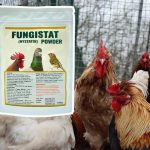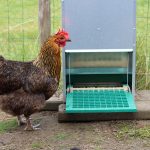Reasons Why A Chicken Stops Laying Eggs
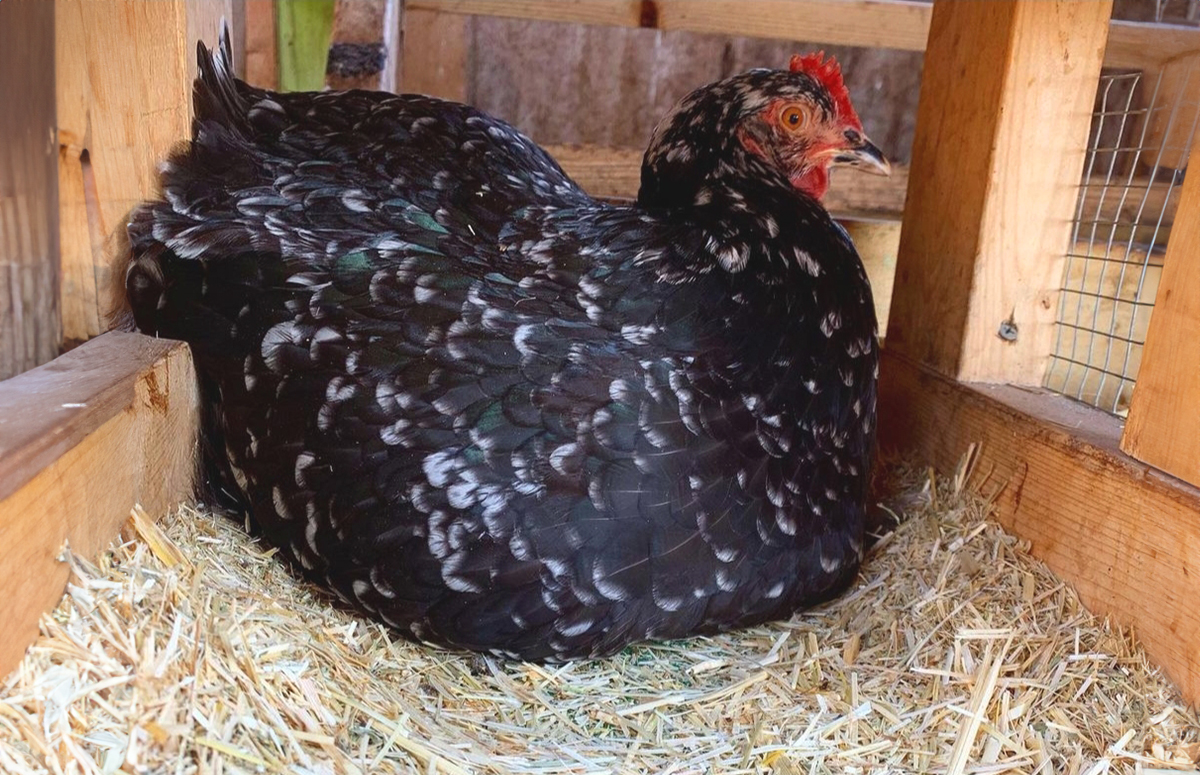
Imagine checking the nesting boxes daily, only to discover an emptiness where you expect fresh eggs. This can be frustrating, especially if it becomes a recurring issue over days or weeks. But fear not – a chicken’s pause in egg production can stem from many factors, some more common than others.
To better understand your hen’s egg-laying cycle, you need to understand all reasons why they can temporarily stop laying eggs.
What Causes Chickens To Temporarily Stop Laying Eggs?
Several factors can temporarily stop a chicken from laying eggs, including stress, changes in daylight hours, molting, illness, nutrition, and age. Stress and environmental factors disrupt their hormonal balance, while molting and age reduce egg production. Proper care can help address these issues and restore egg-laying.
Here’s a list of common reasons why your chickens (temporarily) stop laying eggs:
- Age
- Seasonal Factors
- Molting
- Stress
- Nutrition
- Disease and Illness
- Broodiness
- Environmental Factors
- Breed
- Parasites
First, you need to understand that chickens don’t lay eggs around the clock all the time. Egg production is a complex process that usually takes anywhere from 23 to 36 hours.
Any sudden stress or disturbance during that period can cause the chickens to halt the process and stop laying eggs like normal. It will take a while for them to calm down and return to their routine.
While you want your chickens to keep producing eggs for you all year round, you need to understand that they also need time to rest and recuperate from all the hard labor of laying eggs.
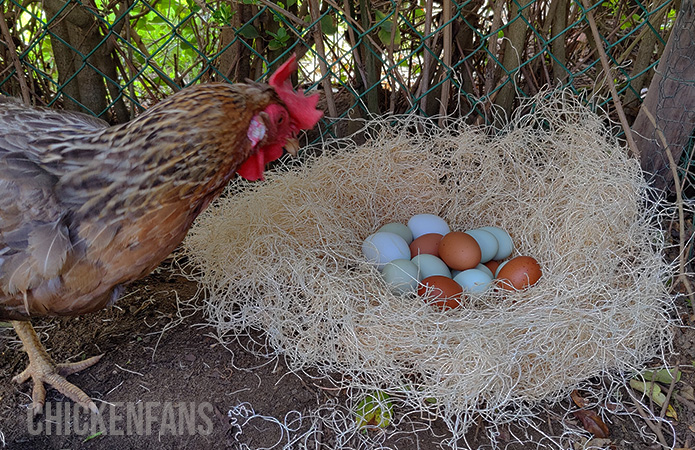
However, those are not the only reasons why chickens stop laying eggs. A change in their feed, the amount of daylight they get, various diseases, parasites, and many more can all cause your chickens to stop laying eggs. By having a good understanding of why your chickens temporarily stop laying eggs, you can then pick out the best option available to help them get back on track.
1. Age
Hens typically begin laying eggs at around five to six months of age, and their egg production is highest in the first year or two. After the first years, the egg production of your hens will start to decrease little by little until they stop laying eggs altogether.
The average chicken lifespan is between five to ten years, but it mainly depends on whether it’s a hybrid bird or a heritage breed. Hybrids live, on average, only two to four years, while heritage breeds can live up to ten years.
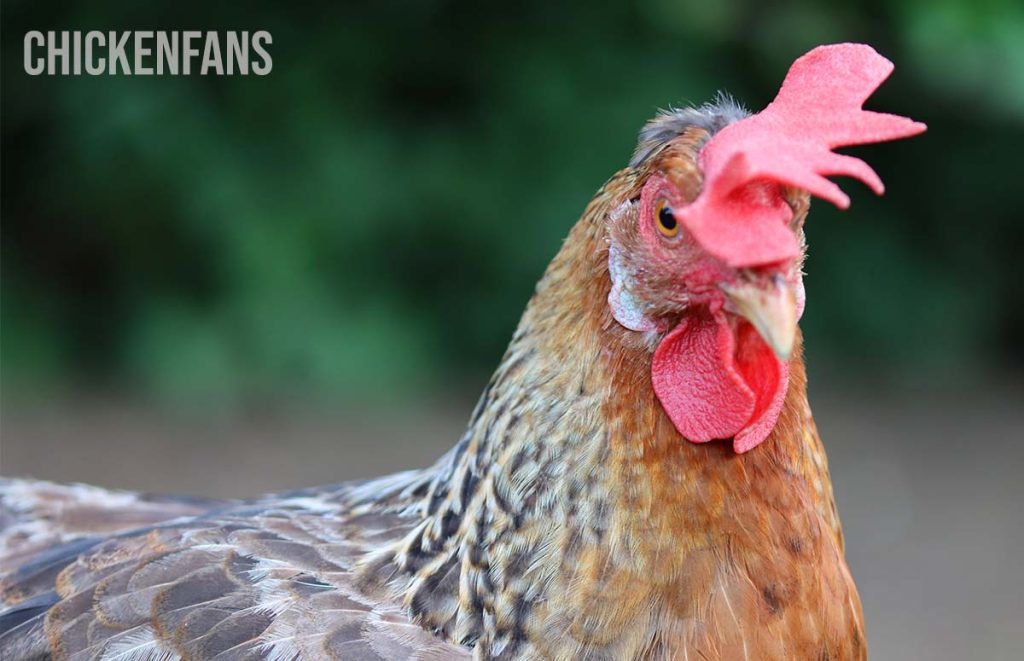
The exact age at which a chicken stops laying eggs mostly depends on whether it’s a hybrid or heritage breed. Most hybrids significantly reduce egg production after only two to three years, while heritage breeds keep on laying well into old age.
Next to the breed, genetics is also a factor. Hens are born with a fixed set of tiny egg yolks growing in follicles in their ovary. On average, hens will lay about 600 eggs during their lifetime, but it can vary from chicken to chicken. If all the ovaries have been released, there will be no more eggs.
2. Seasonal Factors
Daylight hours greatly influence the egg-laying process. For a hen to sufficiently produce and lay eggs regularly, it needs at least 12 hours of daylight. If you want your hens to perform at their best regularly, they need between 14 and 16 hours of daylight daily.
The reason why your hens need a constant amount of daylight is because of the pineal gland inside their brains. Exposing hens to a constant amount of daylight causes the pineal gland to release hormones like serotonin and melatonin that help with egg production.
This is why you often see your hens pausing the egg laying during the winter season or significantly decreasing the amount of eggs. Since your hens are not getting enough daylight, producing eggs is more difficult.
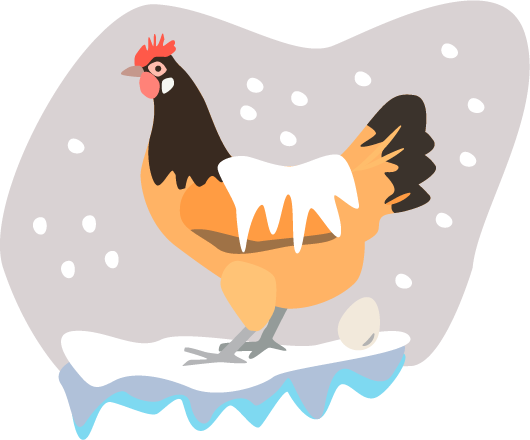
Still, you can expect your hens that are experiencing their first winter season to lay a good amount of eggs, despite the lack of daylight. But after that, their egg production will slow down in the coming winter seasons.
We suggest not using any artificial light inside the coop during winter to increase egg production. A winter break is just what they need to stay happy and healthy.
3. Molting
Chickens periodically go through a molt, where they shed old feathers and grow new ones. This usually happens once a year during the autumn season.
During this time, your hens need to focus on growing back new feathers, so you can expect a significant drop in egg production. This is a natural process that all chickens go through, and it’s not something that you need to worry about.
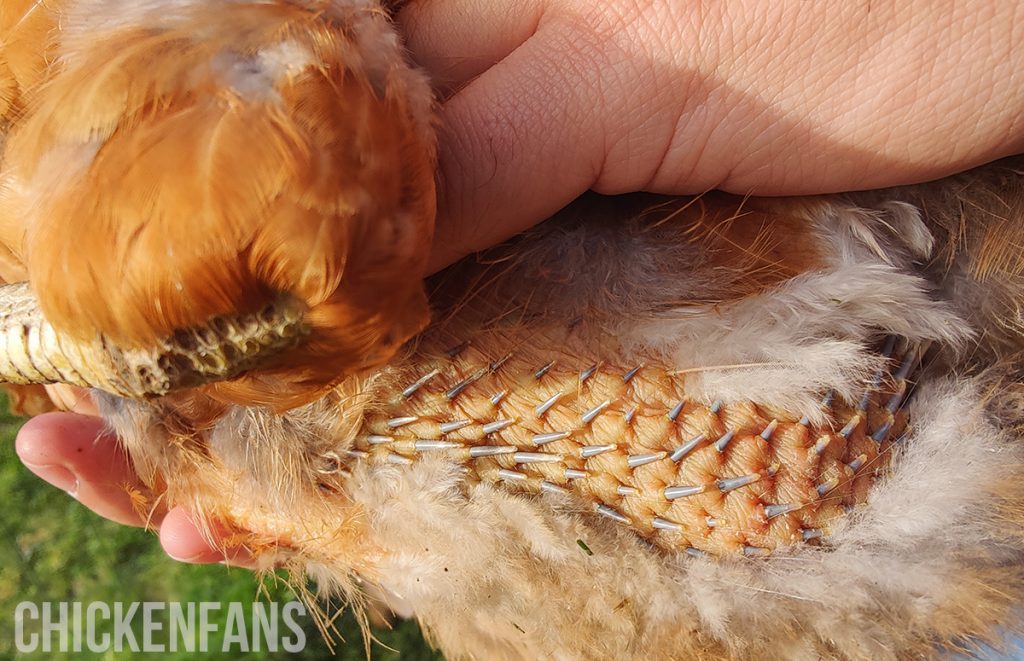
If you want to help out your hens during the molting process, increasing the amount of protein in their feed will help when it comes to growing their feathers back. And the quicker your hens regrow their feathers, the faster they can resume laying eggs.
4. Stress
Stressors such as high temperatures, predator threats, or environmental changes can cause hens to temporarily stop laying eggs. Because of how complex egg production is, a hen’s body can temporarily halt egg production in the face of stress and danger.
Predators like cats, snakes, hawks, and many more can cause stress for your hens. If there’s one prowling around the housing coop, hens will stay on high alert and focus their energy more on survivability and escaping instead of laying eggs.
Additionally, a change in their usual environment or loud noises near the coop can cause them stress and anxiety.
Another thing to take note of is extreme temperature changes. Extreme heat and cold will cause your hens to use more energy than usual, thereby increasing the likelihood of temporarily halting egg production.
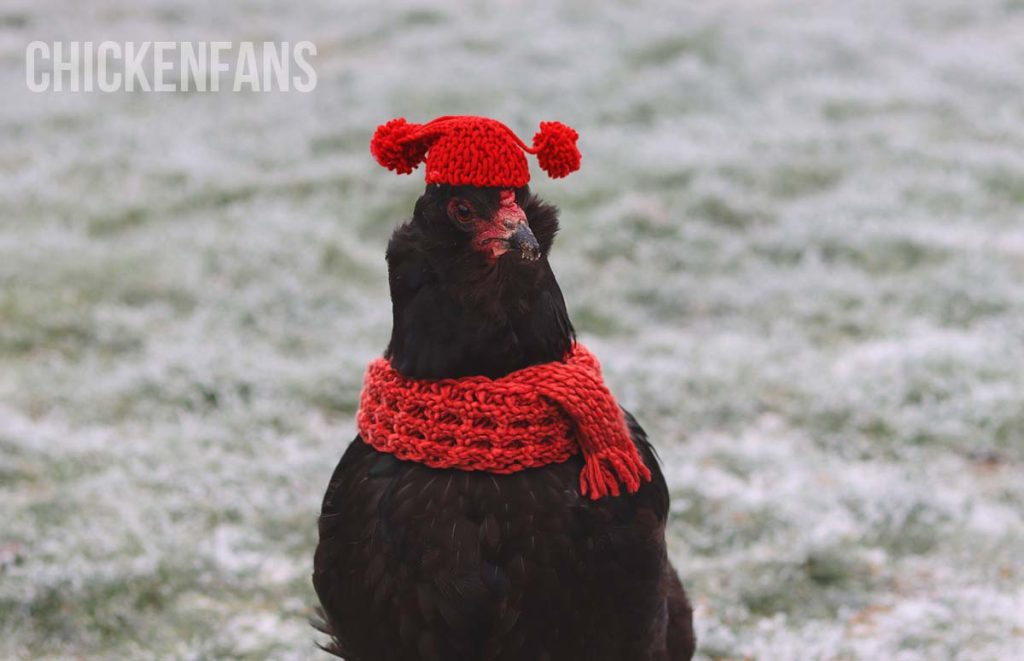
Your hens will more likely suffer from extreme heat. As such, giving them access to shade, plenty of cool drinking water, and enough air circulation in the vicinity will help them stay stress-free.
5. Nutrition
A well-balanced diet with appropriate levels of protein, calcium, and other nutrients is essential for egg production.
Additionally, giving your hens treats or table scraps every day can greatly disrupt their diet. Feeding them treats now and then is fine, but moderation is key. Do not give them more than 10% of their daily feed intake in snacks.
If you want your hens to keep producing eggs regularly, give them a complete feed with all the essential nutrients and vitamins. Whether you buy one from the store or make one at home, you must keep your hens on a well-balanced diet.
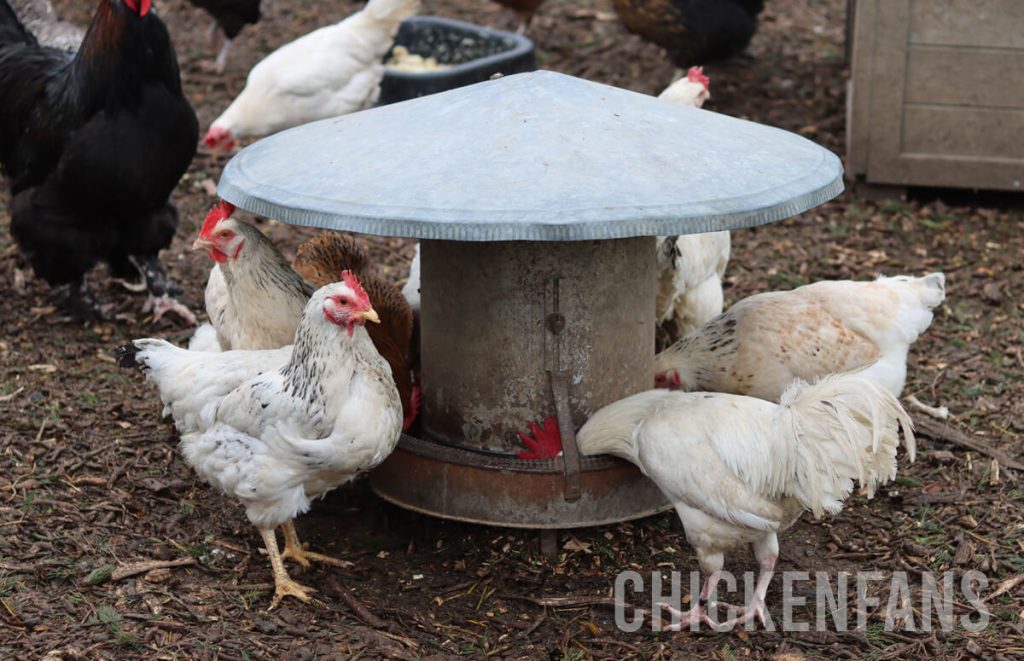
Additionally, among the nutrients that hens need, protein and calcium are two of the most essential ones. Together, they make up at least 20 percent of layer feed.
The protein will help provide the energy that egg production requires, while the calcium ensures that the eggs have strong, well-developed shells. Laying feed is higher in calcium than non-laying feed, around 3-4%, and contains about 16% protein.
6. Disease And Illness
Various diseases and infections, such as respiratory illnesses or reproductive disorders, can impact egg production. Common issues are egg binding, salpingitis, infectious bronchitis, and many more.
Lethargic appearance, watery eyes, constant coughing, dirty vents, and many others are just some of the symptoms that you need to be on the lookout for. Spotting these symptoms early will help you understand why your hens are experiencing a decline in egg production. If you suspect your chicken is unwell, don’t hesitate to bring it to a veterinarian to seek immediate professional help.
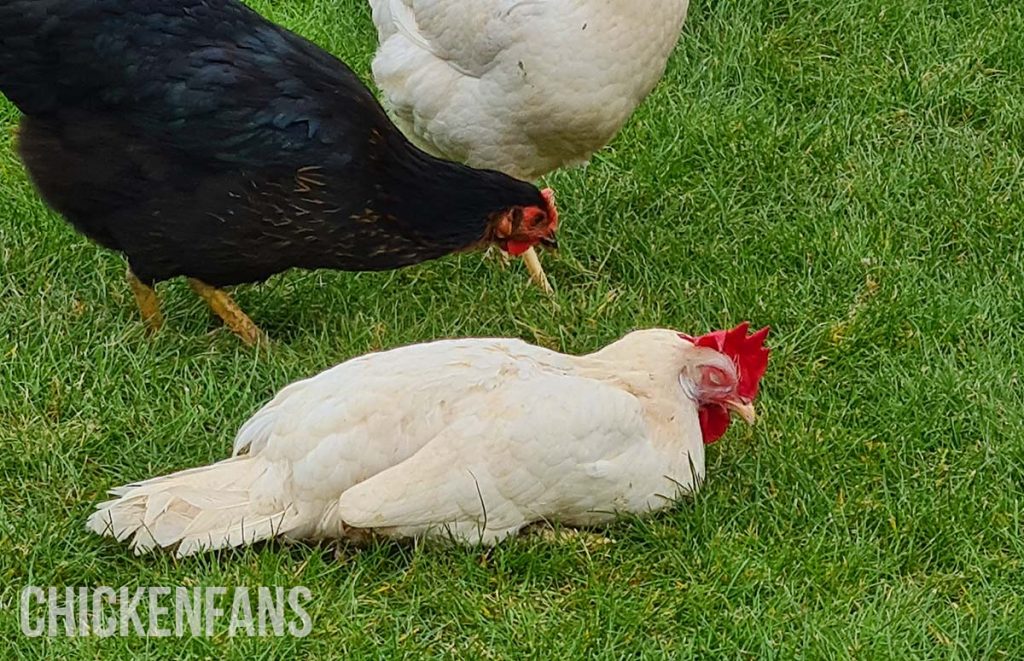
One of the more common diseases that afflict hens is salpingitis. This refers to an inflammation of the hen’s oviduct. Caused by viral and bacterial infections such as Salmonella, MG, and E. Coli, they signal a health issue affecting egg-laying.
Other reproductive issues in laying hands can be noticed if your chicken stands upright, almost like a penguin stand. If you notice this behavior, you will need veterinary advice.
7. Broodiness
Some hens may become broody, which means they have a strong desire to hatch eggs. When a hen is broody, she will stop laying.
Here is what a broody hen looks like:
While broodiness is a good thing for those who want to hatch the eggs, it’s terrible for those who don’t.
Moreover, a broody hen will stop laying eggs and often look for a nest with eggs that don’t belong to her and sit on it, attempting to hatch the eggs. Luckily, there are a few tricks to break this behavior.
Keep in mind that not all chicken breeds quickly go broody; there are a lot of breeds to be found that are known to (almost) never go broody. If you’re not planning on hatching chicken eggs and are just looking for a daily egg supply, it’s best to choose a breed that’s not known for its broodiness.
8. Environmental Factors
Uncomfortable living conditions, such as dirty or overcrowded coops, can discourage your hens from laying eggs. These can cause considerable stress and anxiety for your hens, which will force their bodies to stop laying eggs temporarily.
Luckily, this issue is easy to resolve. Make sure to clean their coop regularly, as it will help improve their mood. If the nesting boxes are not dark enough to allow the hens some privacy, consider placing a curtain over the front of the nesting boxes.
Additionally, you need to know how many chickens you can keep in your backyard to avoid overcrowding.
If you want to know the minimum requirements for a coop and run for your chicken flock, including the number of nesting boxes to provide, try out our ‘Coop Size Calculator’.
9. Breed
Different breeds have varying levels of egg production, and some breeds are known for laying more consistently than others.
There are plenty of chicken breeds to choose from if you want one that can produce a ton of eggs every year. The White Leghorn, Rhode Island Red, and Plymouth Rock are some of the most productive egg-laying chicken breeds. They can produce anywhere between 250 and 300 eggs per year.
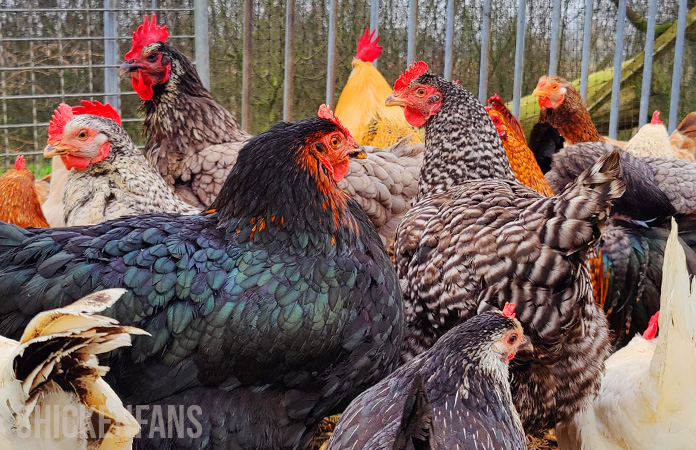
Other breeds, like the Silkies and the Ayam Cemani, will only produce around 150 to 200 eggs per year. That’s a huge difference when the numbers start to pile up.
So, if you plan on raising chickens mainly for their eggs, choose a breed with good overall egg production.
If you want to find out which chicken breeds are at the top regarding egg production, check out the article ‘Best Egg-Laying Chicken Breeds: Top Contenders‘.
10. Parasites
Internal and external parasites, such as worms, lice, or mites, can affect a chicken’s health and egg production. These menaces cause constant irritation to your hens, thereby preventing them from laying eggs.
One way to identify whether or not your hens are suffering from parasites is if they’re preening themselves too much, looking irritated, and pecking their own feathers. You can also check their wattles, combs, and vents for parasites.
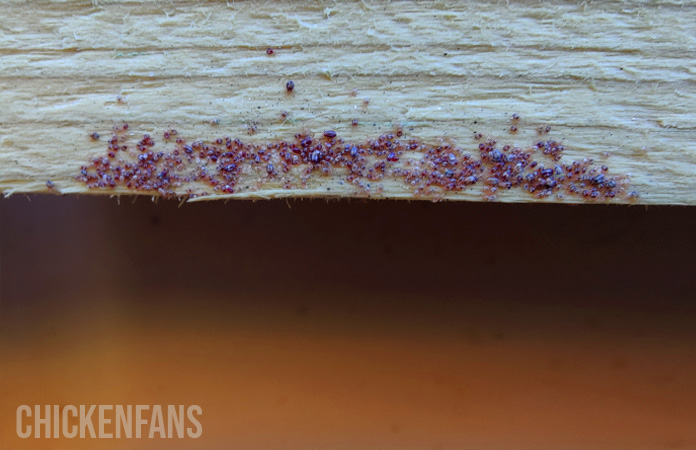
These parasites will irritate your hens, causing them to lose sleep every night. In the case of mites and lice, they will drain your hens of their blood, leaving them feeling anemic in the morning.
To prevent these parasites from feasting on your chickens, cleaning the coop regularly and sterilizing it will help keep these parasites at bay. Additionally, providing your chickens with a place to have a dust bath will help remove these parasites from their bodies.
Summary
Chickens can stop laying eggs due to various reasons, including stress, changes in daylight hours, molting, illness, poor nutrition, and age. These factors can disrupt their hormonal balance and temporarily halt egg production. Proper care and management can help address these issues and restore egg-laying.
If you want to read more about chicken health problems, symptoms, and diseases, check out our ‘Health Page‘. You’ll find a ‘Symptom Checker‘, a complete list of ‘Chicken Behavior‘, and an overview of the most common ‘Chicken Diseases‘. Or go to ‘The Classroom‘ and find a comprehensive list of all Chicken Fans articles.
Credits Featured Image: @4_oaks_ranch (IG)

